Genetic Testing for Cancer: Do You Need It?
September 30, 2021
Cancer care has made giant strides in recent decades. New therapies have been developed and diagnostic tools have improved, allowing doctors to detect the disease in earlier, more treatable stages. However, prevention is the best medicine, and for men and women with a family history, genetic testing for cancer can help determine their risk before the condition develops.
“Thanks to advances in technology, we don’t have to rely only on generalized risk factors or limited medical history. We can determine whose genes put them at higher risk for cancer,” says Kathryn Jones, FNP-BC, AOCNP, who manages the Beaufort Memorial Cancer Genetics and High-Risk Program. “With this information, we take action early when it will have a lasting impact and implement personalized screening plans working with each person’s existing healthcare team.”
Read More: Breast Cancer Myths
Candidates for Genetic Counseling and Testing
Although genetic testing could be performed on anyone, it’s reserved for those at greatest risk of cancer.
“It’s possible that someone who doesn’t meet the criteria has a mutation, but it’s unlikely,” Jones says. “In an effort to prevent unnecessary testing and anxiety, best practice currently encourages testing a specific group of people. At Beaufort Memorial, we are piloting a program that identifies candidates in our Obstetrics and Gynecology Specialists and Lady’s Island Internal Medicine practices. In addition, I meet with each patient before undergoing genetic testing to ensure they’re ideal candidates.”
Candidates for genetic testing must meet one or more of the following criteria:
- Ashkenazi Jewish heritage
- Family history of breast or certain other cancers
- Family history of gene mutation
- Personal history of breast cancer at age 45 or younger
- Personal history of multiple cases of breast cancer at any age
Read More: Cancer Symptoms You Can’t Afford to Miss
If you don’t meet the criteria, that doesn’t mean you’re not at risk for developing cancer. Talk with your health care provider to determine your risk factors and whether lifestyle changes, additional screenings or medical procedures may help lower your risk.
Genetic Testing: Interpreting the Results
When testing finds a genetic mutation, it’s time to take action. You can discuss your results with your doctor to determine the best next steps. Those can include:
- Additional or earlier screenings — You may need to have mammograms or other cancer screenings earlier and more often than those at lower risk.
- Proactive treatments — Your provider may recommend medication known as chemopreventive medication to lower your risk of cancer. Or, you may need surgery to prevent the potential for future specific cancers.
If you’ve already been diagnosed with cancer, your doctor may suggest genetic testing and use the results to guide treatment decisions.
Once you receive your results, share them with your family. Encourage loved ones to consider getting tested. Children can have a 50% chance of inheriting their parent’s gene mutation. With testing, those with a family history of mutations are better able to protect against cancer moving forward.
If you receive a negative test result that indicates you aren’t at risk, continue recommended screenings, such as mammograms and colonoscopies. These screenings are essential to good health and avoiding cancer in the future.\
“As helpful as genetic testing is for predicting a person’s cancer risk, screenings are still vital to helping us detect the disease as early as possible,” Jones says. “Whether through genetic counseling and testing or annual screenings, our goal is to help women and men avoid malignancy.”
Genetic counseling and testing for cancer are available through the Beaufort Memorial Cancer Genetics and High-Risk Program, available in Beaufort and Okatie. Speak with your primary care provider about a referral or call 843-522-7350 for more information.

